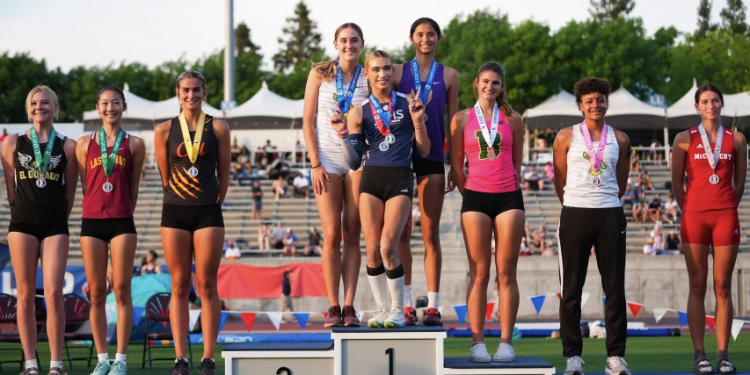A transgender high school athlete took center stage at the California state track and field championships on Saturday, winning gold in both the girls high jump and triple jump. The competition, already in the spotlight, stirred debate and drew national attention.
AB Hernandez competed under a new policy introduced by California’s high school sports authority—one that may be the first of its kind nationwide. The rule was updated ahead of the championships to allow more girls to compete and earn medals in events where Hernandez qualified.
Hernandez cleared 5 feet, 7 inches (1.7 meters) in the high jump with a clean record—no missed attempts. Jillene Wetteland and Lelani Laruelle also reached the same height but had one failed jump each. The three athletes shared the gold, smiling together as they stepped onto the podium.
<img src=”https://media.nbcnews.com/j/xyz” alt=”AB Hernandez on podium”> *AB Hernandez, center, celebrates alongside Jillene Wetteland and Lelani Laruelle during the medal ceremony for the high jump.* **Jae C. Hong / AP**
Later in the evening, Hernandez clinched another gold in the triple jump, tying with Kira Gant Hatcher, who came in just over half a meter behind. Earlier in the day, Hernandez placed second in the long jump.
Olympians Marion Jones (1993) and Tara Davis-Woodhall (2017) previously set long jump records at the California state championships by jumping over 22 feet (6.7 meters). This year, Loren Webster won the event with a jump just beyond 21 feet (6.40 meters), while Hernandez followed close behind.
Earlier in the week, the California Interscholastic Federation (CIF) introduced the new policy in response to Hernandez’s performance and rising public scrutiny. The policy allowed one additional student to compete and medal in the events Hernandez qualified for.
Championship Meets Heat and Controversy
The two-day meet began Friday at a Fresno-area high school under blazing conditions. By Saturday’s finals, temperatures soared past 100 degrees.
Despite the intense heat, the crowd remained relatively subdued, even as critics—including parents, conservative activists, and former President Donald Trump—called for Hernandez to be excluded. Some attendees wore pink T-shirts and bracelets that read, “Save Girls’ Sports.”
During Friday’s qualifying rounds, a plane flew above the stadium for more than an hour with a banner reading: “No Boys in Girls’ Sports!” Two advocacy groups, the Independent Council on Women’s Sports and Women Are Real, claimed responsibility for the banner.
A State at the Center of a National Debate
CIF’s policy aims to strike a balance in the ongoing debate over trans girls’ participation in youth sports.
“The CIF values all of our student-athletes and we will continue to uphold our mission of providing students with the opportunity to belong, connect, and compete while complying with California law,”
— CIF statement following the rule change
A recent AP-NORC poll found that nearly 70% of U.S. adults oppose transgender female athletes competing in girls and women’s sports at all levels—from high school to the pros. The opposition included about 90% of Republicans and half of Democrats.
<img src=”https://media.nbcnews.com/j/xyz” alt=”AB Hernandez medal ceremony”> *AB Hernandez during the medal ceremony for the triple jump* **Jae C. Hong / AP**
CIF officials said they decided on the rule change before Trump’s recent threat to withdraw federal funding from California unless the state bars transgender girls from girls’ teams.
Meanwhile, the U.S. Department of Justice announced an investigation into CIF and the school district housing Hernandez’s high school to determine if they violated federal anti-discrimination laws.
California law permits transgender students to participate on sex-segregated teams that match their gender identity.
CIF said the rule’s purpose was to give more chances to “biological female” athletes. But some experts argue the policy might be discriminatory since it doesn’t offer similar opportunities for other trans athletes. CIF has not clarified how it defines “biological female” or how it would verify that status.
Sophia Lorey, outreach director for the California Family Council, attended the event and criticized the policy as confusing and ineffective.
“At the end of the day,” Lorey said, “it shows the girls that we know this is wrong and we’re still letting it happen to you.”
Hernandez, speaking to Capital & Main earlier this month, said she tries not to focus on the backlash.
“I’m still a child, you’re an adult, and for you to act like a child shows how you are as a person,”
— AB Hernandez
Records Broken Beyond the Headlines
California’s track championships are among the largest in the country. During the 2023–2024 school year, the state had the second-highest number of outdoor track and field participants, behind only Texas, according to the National Federation of State High School Associations.
The boys’ 100-meter heats brought excitement as well. Jaden Jefferson, a junior from De La Salle High School in Concord, ran a blistering 10.01 seconds on Friday—0.19 seconds faster than last year’s meet record. Unfortunately, his time in Saturday’s final slipped to 10.27 seconds, just missing a new official record.
Several athletes set new meet records across events, adding to a historic and headline-grabbing weekend for California high school sports.








